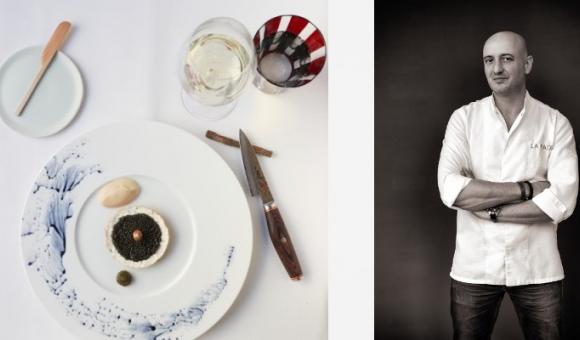CHEF OF THE 2 MICHELIN-STARRED RESTAURANT LA PAIX, AS WELL AS OTHER ESTABLISHMENTS INCLUDING BLACK PEARLS IN BRUSSELS AIRPORT, LE LIEU IN GENAPPE, ETC., DAVID MARTIN IS JUST AS PASSIONATE ABOUT CONTEMPORARY ART. WE MET THE 2019 CHEF OF THE YEAR IN HIS RESTAURANT, FOR A LIVELY, FRANK EXCHANGE.
What does being crowned Chef of the Year represent for you?
It's important, but not in the sense of a pretty certificate to hang on the restaurant walls. It's a professional reassurance. When I am creating a new dish, my desire for creativity sometimes leads me away from the very people I want to please. So this type of award is reassuring. It proves that I am on the right path and that my customers have understood the intelligence and flavours of our cuisine.
Today, every (or almost) chef pays tribute to the artisans and producers. There is a trend of mentioning them on the menu: do you like this, or does it annoy you?
All trends have an annoying side when they are taken to extremes. This is even true for the 'locavore' trend. Mentioning the name of a producer next to the dish on the menu isn't necessarily a sign of quality. When you boast of using only products sourced within 60 kilometres of the restaurant, but then you use soy sauce, it becomes laughable. When I mention the origin of a crab or a sake, I am simply trying to inform my customers. Not making a marketing pitch.
You are close to Belgian designers, such as Charles Kaisin, who created the origami sculpture on the ceiling of La Paix, and Kaspar Hamacher, known for his monoxyle sculptures. What attracts you about them?
Six years ago, when I decided, after a trip to Japan, to completely rethink my way of working, I not only reviewed the menu, but also the decor of the restaurant. I kept the elements that made up the soul of the place, including the worn Formica counter and mahogany Art Deco bank counters, and I added works that told the rest of the story: the origami of Charles Kaisin reflects the old columns of the restaurant. This structure links the old and the La Paix.
The Kaspar Hamacher installation in fire-sculpted oak – titled la Paix -, a modular composition centred on three rounded openings, refers to my passion for the Land of the Rising Sun. This work links the dining room and the kitchen.
In a restaurant like yours, the culinary experience is primordial. How do you envisage it?
Honestly, that's a term that annoys me. I prefer the expression "table moment". For me this term encompasses both the place, which here has a strong story, and the message you are trying to deliver through the plates served to each person. I want that message to be both radical and sharp, while remaining very legible. The alliance of the two rises to the level of the intangible and the immaterial, and connects the feelings of those who have come to experience a strong and unique moment. The rest doesn't matter.
Art is a key element in your life. When it enters your restaurant, does it contribute to sublimating this "table moment"?
For six years, I operated the Bozar Brasserie in downtown Brussels. The fact that it was attached to the Palais des Beaux-Arts influenced my decision to set up there. The chairs at La Paix (initially chosen for Bozar) are original models by Danish Arne Jacobsen for Fritz Hansen. Their colour – a fabulous Horta blue – was inspired by the colour of the linoleum at the museum. In another vein, I just did a dinner together with chef Willem Hiele in the workshop of painter Denis Meyers. What motivates me to engage in one project rather than another is the integrity of the people. Before falling in love with a work, I need to love the personality of the artist.
Is that what motivated you to create Le Lieu in Genappe.
Everything started from my meeting with artisanal coffee roaster Serge Luypaert and his companion, artist Goedele Van Renterghem. We organise tasting, exhibits... It's a restaurant, but also an art gallery and a meeting place.
You place of importance on the aesthetic of your dishes. Can we see a link there with your passion for contemporary art?
Yes, although today I avoid that first-level trap I had a tendency to fall into in the past. I no longer try to reproduce the forms or colours of a work that speaks to me. What interest me is the gesture. When I make a cut, I look for the good angle, the one that exposes the texture of the ingredient, and gives another dimension to the composition on the plate. I also have some Japanese knives in my kitchen that are works of art in their own right.
What is your perspective on creativity in Belgium? In the domains of art, design, music and, of course, gastronomy?
It is dynamic and very present, but what I miss is a true valorisation of this creativity. What motivates me are the instigators, not the copiers. When art becomes too commercial, it no longer amuses me.
Today, chefs are public figures. How do you feel about this star status?
You know, this isn't a status we asked for. When I decided to follow this career, open kitchens didn't exist. We were anonymous. For me, I always did what I felt like. I took risks. So I don't care about the star system. I try above all to remain true to myself. When you lie, people can feel it right away. What is certain, is that I have lived the things I wanted to live. One morning, I will stop everything, just like that. And it will be over. I will play saxophone, or learn another instrument. Or I will open a garage for classic cars. We will just have to see...
Interview by Marie Honnay
